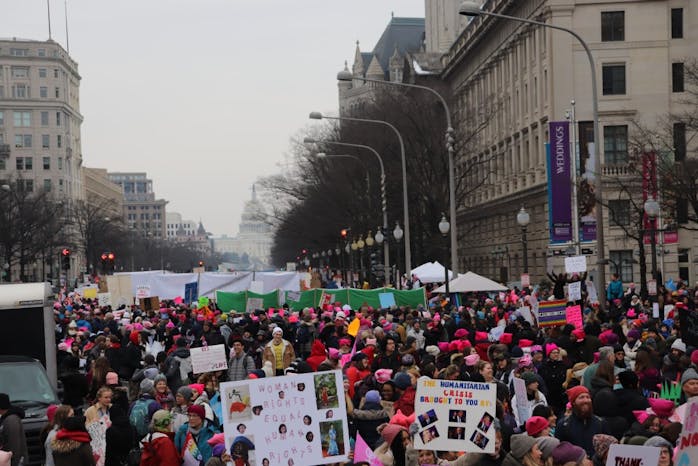American University students took to the streets of D.C. on Saturday, joining thousands of protesters for the third annual Women’s March.
For many students, this was their first time marching, stating that they were motivated to take part in the march because of the current political climate, sexist remarks made by prominent politicians and the lack of women in elected office. Although the march’s leadership has faced recent controversies surrounding allegations of anti-Semitism, participants said they still believed in the value of the march.
Students connected AU’s emphasis on civic and political involvement with their interest in protesting on Saturday, stressing that many of the values expressed during the march are often integrated into their experience at AU.
“There is a really hyper political climate [at American] and even though its overwhelming sometimes, I think in moments like this it is really powerful,” said Emma Lovato, a freshman in the School of Public Affairs.
Lovato wasn’t the only freshman marching. Many students new to D.C. spoke about the political activism evident both at AU and in the city. More than one credited this atmosphere with their choice to attend AU.

Protesters gather in Freedom Plaza for the Women's March on Jan. 19. SAMI PYE/THE EAGLE
Cora Coggshall, a freshman who transferred to AU’s Kogod School of Business at the start of the spring semester, said that the energy of her peers excited her. Katherine Waples, a recent sophomore transfer to the School of International Service, said that she came to D.C. to be in an environment where people were socially and politically aware.
“It is really important to be amongst people, even if they don’t share your exact belief system, who are willing and able to speak out for whatever their beliefs are,” Waples said.
More than two dozen AU College Democrats attended the March, despite the fact that the Democratic National Committee withdrew support from the march’s founders over allegations of anti-Semitism. Angela Chen, the president of AU Dems and a sophomore in the School of Public Affairs, said she made the decision to lead a group of members because she wants to prove that the alleged beliefs of the founders are not indicative of the march’s activists.
“I made the decision to think of the march as something that’s bigger than just the founders,” Chen said. “I think it’s a movement that started from the bottom, up, and the idea of it is that women unite together for intersectionalism and equality that represents everyone.”
Between the cold weather and the reported allegations, turnout at the march was significantly lower than previous years. Compared to the first Women’s March in 2017, which drew 440,000 protesters in Washington alone, the Associated Press estimated that about 100,000 people took to the streets of Washington this year.
Still, students protesters interviewed by The Eagle were energized and excited about recent advancements for women in politics. Freshman Emma Cabral believed that the recent midterm elections signaled a change for women in politics. The march made her hopeful that similar progress will be made in future elections, she said.
Although this election cycle was viewed by many protesters as a victory for female and minority candidates, several march participants held signs demonstrating their anger and frustration over the appointment of Brett Kavanaugh to the Supreme Court. Kavanaugh was accused of sexually assaulting Christine Blasey Ford, who testified before a Senate committee about her experiences.
“I believe as a guy this is a time for us to open up our eyes and … really, really understand the stories of so many brave women and this is a perfect example of how to do that, how to show that support,” said Sam Billings, a sophomore in the School of International Service.
The march also had an influence on sorority recruitment this year. AU’s Panhellenic Executive Board pushed back sorority recruitment to last through Tuesday because the original recruitment schedules had originally coincided with the march, preventing many sorority members and pledges from attending.
Kristin Avenis, a freshman in the School of International Service, said she has noticed more “unity than usual” among her classmates on working to change policies through the legislative process and advocacy.
“Honestly not through activism am I the most inspired,” Avenis said. “I am inspired by the people in my classes because they actually speak about changing legislation and working to fix it in a much more realistic way.”
kcarolan@theeagleonline.com, emargiotta@theeagleonline.com, dpapscun@theeagleonline.com




